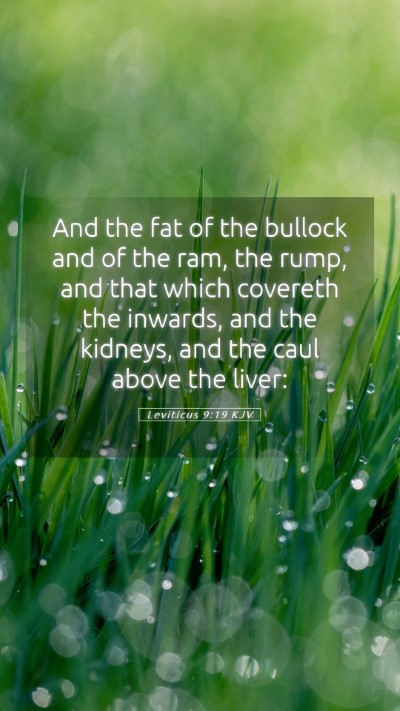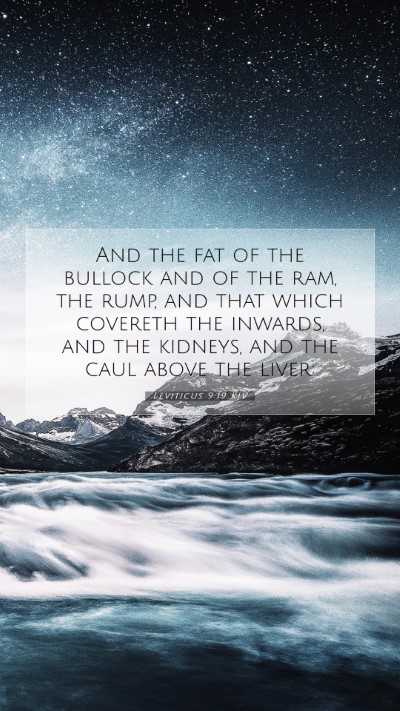Bible Verse Explanation: Leviticus 9:19
Leviticus 9:19 states:
"And the fat (of the bullock and of the ram) shall they burn upon the altar: it is the offering made by fire, of a sweet savour unto the LORD."
This verse is part of the instructions for the priesthood and their duties regarding sacrificial offerings. Below is an analysis of its meaning, combining insights from Matthew Henry, Albert Barnes, and Adam Clarke.
Understanding the Verse
The essence of Leviticus 9:19 lies in the ritual of sacrifices, which were a crucial part of Israelite worship. The burning of the fat was not only a practical act but also a symbolic gesture of offering the best portions to God.
Symbolism of Sacrifices
- Divine Acceptance: The phrase "sweet savour unto the LORD" indicates that these offerings are pleasing to God. It reflects His acceptance of the worshipper's sincerity and repentance.
- Purity and Honor: The fat was considered the richest part of the animal, symbolizing the worshippers returning to God the best of their possessions, demonstrating both reverence and gratitude.
Insights from Commentaries
Matthew Henry
Henry emphasizes the importance of the fat in the sacrificial system, noting that it represented what was valuable and precious. He underscores that every offering, if made rightly, was deemed acceptable to God.
Albert Barnes
Barnes highlights that the act of burning the fat on the altar served as a visual reminder to the Israelites of God’s holiness and the need for sacrificial atonement for sin. This verse showcases the ongoing need for offerings in the covenant relationship between God and His people.
Adam Clarke
Clarke reflects on the historical context, noting that the instructions provided were foundational for the Israelites in establishing proper worship practices. He points out that these rituals were an intrinsic part of their identity as a chosen people of God.
Bible Verse Commentary
The commentary on Leviticus 9:19 reveals much about sacrificial systems. It shows the profound connection between worship and sacrifice, illustrating how essential offerings were to maintain a relationship with God.
Cross References
- Exodus 29:18 - Discusses the process of burnt offerings.
- Leviticus 3:16 - Talks about the fat belonging to God as a burnt offering.
- Numbers 28:2 - Provides instructions on daily sacrifices.
Applications of the Verse
Understanding Leviticus 9:19 helps reveal the significance of offering one's best to God, an important principle that transcends Old Testament practices and remains applicable today. Worshippers should consider how they can present their best, whether it be time, resources, or service.
In-Depth Bible Study Insights
By engaging in Bible study groups or utilizing online Bible study tools, individuals can explore passages like Leviticus 9:19 deeply. These insights help connect historical contexts with modern applications, leading to a better understanding of scriptural teachings.
Conclusion
Leviticus 9:19 provides a rich tapestry for understanding God's expectations regarding worship. By combining historical, cultural, and theological insights, believers can appreciate the significance of sacrificial offerings and their implications for worship today.
Final Thoughts
As you explore the meaning and interpretations of Bible verses like Leviticus 9:19, consider how these principles apply to your daily life. The Scriptures offer invaluable wisdom that guides believers towards deeper faith and obedience to God.


